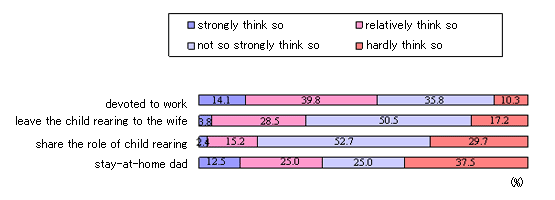- Research Design Outline
- Chapter 1: The Relationship with Their Partners and Children (excerpt) (This article)
- Chapter 2: Fathers' Views on Child-rearing, Education and Family (excerpt)
- Chapter 3: Fathers Reconciling Work and Family
Figure 1-1-1 shows the ideal amount of time fathers want to spend with their children and the actual amount of time fathers spend with them on weekdays. The majority of fathers, 27.0 percent, answered they spend "1 to 2 hours" a day with their children. The fathers who answered they spend "less than 1 hour" and "more than 2 hours" are 36.7%, 36.3% respectively. For nearly 30% of fathers, the ideal amount of time they want to spend with their children on weekends is "2 to 3 hours".
Figure 1-1-1: Reality and ideal hours of staying with children
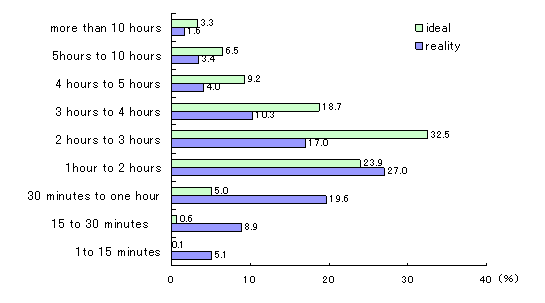
As for the question about the relation with their children, 94.3% of fathers answered that they think children need them, and 78.5% said that making their children happy is a kind of purpose in life. Both percentages are quite high; children seem to be a vital presence for fathers. 73.5% of fathers evaluate themselves as being able to entertain their children well. Many fathers think they get along with their children.
Figure 1-1-4: Relationship with their children
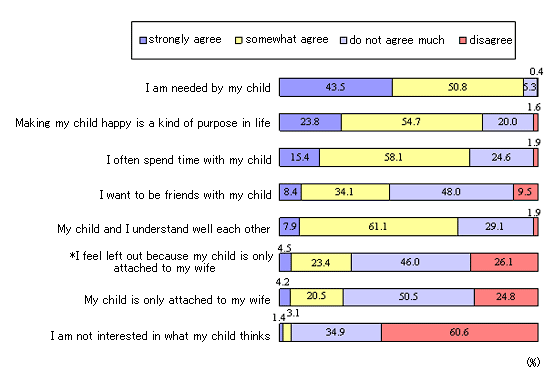
*Note: This includes the percentage of fathers who would feel so if their child were only attached to their wife.
As for participating in household matters, 40.4% said they take out the garbage almost every day and 34.4% said they participate directly in childcare such as scolding or praising their children. Fathers who answered they hardly play with their children at home, and they hardly bathe their child are only 2.4% and 9.5% respectively. However, 64.8% answered they seldom cook and 41.0% said they hardly ever wash the dishes. Though fathers appear positive about developing a bond with their children, they tend to avoid doing household chores that are not related to children.
Figure 1-2-1: Fathers' participation in child rearing and household matters
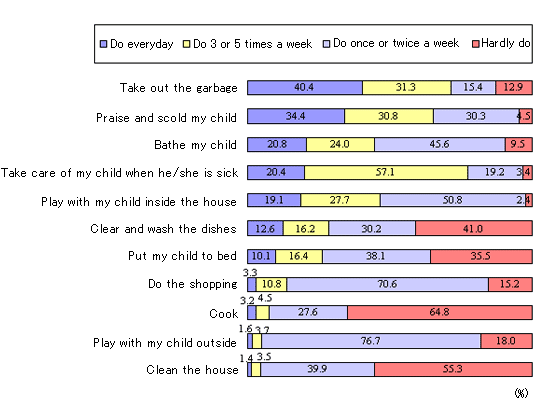
| 1. | devoted to work; thinking household chores should be managed by the wife |
| 2. | leave the child rearing to the wife; want to participate more in upbringing but can't do so due to being busy |
| 3. | share the role of child rearing; share the role as much as possible |
| 4. | stay-at-home dad; father mainly dedicated to child rearing |
Figure 1-2-10: 4 types of sharing of household chores and child rearing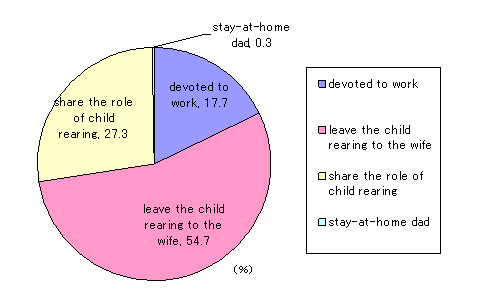
![]() Figure 1-2-11 shows the relation between the 4 types and the time fathers return home
Figure 1-2-11 shows the relation between the 4 types and the time fathers return home
Type 2, "leave the child upbringing to wife" type comes back home very late in comparison with the other tree types. 19% of them come back home after 23:00 and 56.4% come back between 20:00 and 22:00, which means a total of 75.4% come back after 20:00.
Figure 1-2-11: Type of sharing household chores and child rearing and time of coming home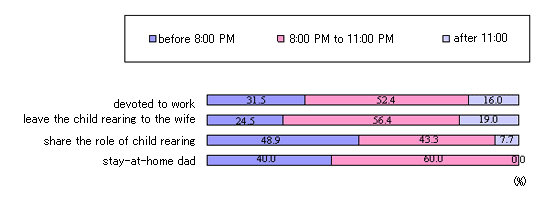
![]() "Devoted to work" type fathers do not seem to want to participate in the household chores and child rearing
"Devoted to work" type fathers do not seem to want to participate in the household chores and child rearing
"Devoted to work" type fathers seem apparently to have less intention of getting involved in household chores and childrearing. This type has a stronger conventional attitude, that is, "men work outside and women stay at home" (Figure 1-2-19)
Figure 1-2-19: Awareness of 4 types (Man should work outside and Women should stay at home)
